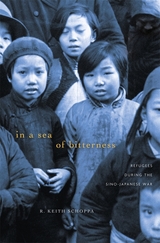
With the Qing Dynasty reform efforts (1901–1911), abolition of the civil service examination (1905), and the end of the monarchy (1912), the first three decades of the twentieth century brought important changes to the elite of Zhejiang Province. This book examines the social backgrounds, public activities, careers, and decision-making of local and provincial elites—that is, nonprofessional men who had taken on public duties when the multiplying problems of government had resulted in a general breakdown of public functions.
While elites in early twentieth-century China have often been caricatured as militarists, corrupt bureaucrats, evil landlords, and ineffectual reformers, they have not been clearly understood or closely analyzed. Since the seventeenth century, elites had been assuming increasing responsibility for funding and managing public projects, and by the twentieth century had expanded their activities still further. In the first three decades of the century, they experienced substantial personal and communitarian development; it was the structures and processes developed by these elites that subsequent regimes—Guomindang, Japanese, or Communist—had to build upon and adapt.
Keith Schoppa divides the counties of Zhejiang Province into four zones according to level of political and economic development and scrupulously analyzes the complex processes of remolding society at the local and provincial levels. By delving beneath the heroic figures and large movements of Chinese political life in this century, he reveals the common factors that make China a part of the worldwide story of reconstruction, reform, and developmental change.

The Japanese invasion of Shanghai in 1937 led some thirty million Chinese to flee their homes in terror, and live—in the words of artist and writer Feng Zikai—“in a sea of bitterness” as refugees. Keith Schoppa paints a comprehensive picture of the refugee experience in one province—Zhejiang, on the central Chinese coast—where the Japanese launched major early offensives as well as notorious later campaigns. He recounts stories of both heroes and villains, of choices poorly made amid war’s bewildering violence, of risks bravely taken despite an almost palpable quaking fear.
As they traveled south into China’s interior, refugees stepped backward in time, sometimes as far as the nineteenth century, their journeys revealing the superficiality of China’s modernization. Memoirs and oral histories allow Schoppa to follow the footsteps of the young and old, elite and non-elite, as they fled through unfamiliar terrain and coped with unimaginable physical and psychological difficulties. Within the context of Chinese culture, being forced to leave home was profoundly threatening to one’s sense of identity. Not just people but whole institutions also fled from Japanese occupation, and Schoppa considers schools, governments, and businesses as refugees with narratives of their own.
Local governments responded variously to Japanese attacks, from enacting scorched-earth policies to offering rewards for the capture of plague-infected rats in the aftermath of germ warfare. While at times these official procedures improved the situation for refugees, more often—as Schoppa describes in moving detail—they only deepened the tragedy.
READERS
Browse our collection.
PUBLISHERS
See BiblioVault's publisher services.
STUDENT SERVICES
Files for college accessibility offices.
UChicago Accessibility Resources
home | accessibility | search | about | contact us
BiblioVault ® 2001 - 2024
The University of Chicago Press









